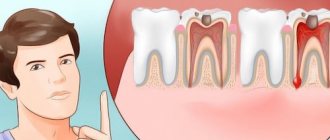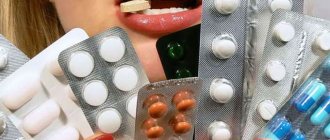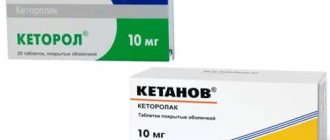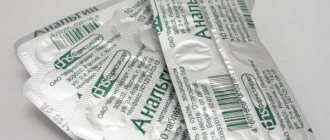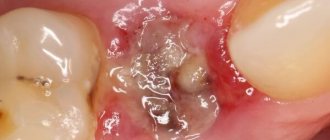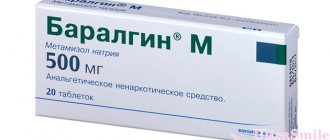Nimesil for toothache is considered one of the most effective remedies that can eliminate this unpleasant symptom. The medicine has anti-inflammatory properties and is classified as a non-steroidal drug. Nimesil for toothache has one important feature: it begins to act within 30 minutes after administration, and the effect lasts about six hours. Despite such high effectiveness, the use of the drug, according to some doctors, can lead to serious consequences.
"Magic" pills
There is a group of drugs collectively called non-steroidal anti-inflammatory drugs (NSAIDs), which we all have taken at least once in our lives, and many regularly. These are drugs that have analgesic, anti-inflammatory and/or antipyretic effects. Examples include Aspirin, Nurofen, Nice, Ketanov, Ketoprofen and others. Considering the “magical effects” of their action - relieving inflammation, pain and fever - they are prescribed by almost everyone, everyone, always. Prescribed by traumatologists, rheumatologists, therapists, ENT specialists, dentists. Plus, they can be purchased completely freely at any pharmacy. But, along with the “magical properties”, these drugs have a number of side effects that can be divided into 2 groups: cardio risks and gastro risks. Actually, gastrorisks will be discussed in this article.
Contraindications
Nimesil has a fairly large list of contraindications. Therefore, before using the medicine, it is recommended that you familiarize yourself with this list. According to the instructions for the drug, it is contraindicated in the following cases:
- There is hypersensitivity to the active substance (nimesulide)
- Diagnosed with rhinitis, urticaria
- Signs characteristic of bronchospasm are observed
- Have renal and/or heart failure
- The patient is taking other medications that are highly toxic
- Inflammation in the intestines
- Stomach ulcer, bleeding, low blood clotting were diagnosed
- Pregnancy and lactation
- Age up to 12 years
Nimesil is also contraindicated for use in combination with alcohol and drugs.
Elderly patients are advised to take the drug with caution, as it belongs to the NSAID group of drugs.
NSAID gastropathy
In the scientific literature, this problem is called “NSAID gastropathy.” The term was first proposed in 1986 to distinguish specific damage to the gastric mucosa that occurs with long-term use of NSAIDs from classic peptic ulcer disease.
The difference between NSAID gastropathy and peptic ulcer disease can also be traced by the affected area. Most often, ulcers can be seen in the stomach, and not in the duodenum. Plus, the changes are more common in older people than in younger people.
Use for toothache
Powder is poured into warm liquid
The medicine is intended for oral administration.
Any anti-inflammatory drugs are recommended to be taken after meals, which is necessary to accelerate absorption in the intestines.
The tablets are taken by swallowing the drug.
It is recommended to take the medicine with a sufficient amount of liquid. The method of using the powder is different.
Instructions for use:
- The contents of the sachet are poured into a glass;
- The powder is poured with warm liquid (about 1/3 cup);
- The mixture is thoroughly stirred;
- The resulting liquid is taken orally.
As a rule, one dose (100 mg of Nimesulide) is enough to eliminate the unpleasant symptom.
Important to remember! The drug in gel form is not used in the treatment of dental diseases or any other pathologies of internal organs or mucous membranes. The gel is prescribed exclusively for the treatment of joint pain for local application.
Dosages
For toothache, take 1 dose of the drug. If the pain syndrome resumes, re-administration is carried out no less than 6 hours later.
The maximum daily dose is 400 mg (4 tablets). Long-term treatment of toothache with Nimesulide is contraindicated due to possible side effects.
Some numbers
Some statistics. In the UK, approximately 24 million NSAIDs are prescribed per year. 70% of people over 70 years of age take NSAIDs once a week, and 34% daily. In the United States, up to 6 billion worth of NSAIDs are sold annually. As a result, the risk of developing gastrointestinal bleeding (GIB) increases 3–5 times, perforation by 6 times, and the risk of death from complications by up to 8 times. Up to 40–50% of all cases of acute gastrointestinal tract infections are associated with NSAIDs.
This problem is also relevant in our country, for example, according to the Scientific Center for Cardiovascular Surgery named after. A.N. Bakulev, out of 240 patients taking aspirin daily, even in small doses, gastroscopy revealed lesions of the stomach and 12 p.c. in 30% (of which ulcers - in 23.6%, erosions - in 76.4%). A similar picture was observed among colleagues from the All-Russian Research Institute of Rheumatology of the Russian Academy of Medical Sciences - in 2126 patients taking NSAIDs without “covering” (protection) of the stomach, erosions and ulcers of the gastroduodenal zone were found in 33.8% of cases. These are very impressive and dramatic numbers of complications from taking NSAIDs, considering the number of people using these drugs in developed countries.
Interactions
Nimesulide increases the activity of antiplatelet agents and anticoagulants. Concomitant use of this drug with diuretics reduces their effectiveness, which can lead to edema, especially in patients with hypertension and renal failure.
Nimesulide also increases the toxicity of cyclosporine and methotrexate. And its simultaneous use with GCS and serotonin reuptake inhibitors significantly increases the risk of bleeding in the digestive tract.
How it works?
How do these drugs work in our stomachs? Everything is very simple, the negative impact is realized due to the imbalance of defensive and aggressive forces. We have a number of defense mechanisms in our stomach that allow us to withstand the onslaught of aggressors. Among the latest:
- An acid whose pH balance is close to that of battery acid
- Bile and pancreatic juice, which can be thrown into the stomach.
- A number of medications.
- Alcohol and nicotine.
- Irritating food components (spices, spicy foods, etc.)
- Helicobacter pylori infection and so on.
The stomach is protected due to a thick layer of mucus and bicarbonates that neutralize acid, adequate blood supply, and the ability to regenerate very quickly. When we use NSAID drugs, the balance of forces changes towards aggressive mechanisms and damage occurs to the mucous and submucosal layer of the stomach and duodenum.
Nimesulide, Nimesil, Nimulid - are there any differences?
The drug Nimesil is available exclusively in powder form
The question of whether there is a difference between the presented drugs is very relevant.
In general, these drugs are direct analogues. They have the same active ingredient - Nimesulide.
The differences lie solely in the release form and secondary components.
The drug Nimesil is available exclusively in powder form.
Nimulid can be purchased in gel form, but it is also available in syrup form. This medicine contains a low dose of Nimesulide, which is why it can be prescribed in pediatrics.
Which product should I choose?
To eliminate toothache, it is recommended to use Nimesulide tablets or Nimesil powder. They have the same concentration of the active ingredient - 100 mg.
Nimulid syrup can be given to children under 12 years of age, but in childhood many other painkillers that are safer for the child’s body can be used.
Diagnostics
To diagnose such changes, gastroscopy is used, which is the “gold standard”. An interesting fact is that about 40% of patients with erosive-ulcerative changes who take these drugs for a long time (more than 6 weeks) do not feel any discomfort or unpleasant, painful sensations. Stomach problems are diagnosed only when visiting other doctors, and not a gastroenterologist. And, conversely, in 40% of patients, despite the complaints they make, nothing is found.
Indications for use
Nimesil is recommended for use for various pain syndromes. These may be sensations caused by the onset of menstruation, surgery, head diseases and dental problems. The drug is used to eliminate pain arising from the following pathologies:
- Gynecological
- Vascular
- Urological
Nimesil is used for pain, including toothache.
Nimesil demonstrates good effectiveness in eliminating pain caused by dysfunction of the musculoskeletal system. In addition to the main effect that the drug has, it is able to restore body temperature, regardless of the reasons that caused its increase.
Nimesil is often prescribed for toothache due to the fact that the drug has a powerful effect in relieving pain. Dentists resort to this drug because it quickly eliminates discomfort for quite a long time.
The active ingredient of the drug is nimesulide. If there is individual intolerance to individual components of Nimesil, it can be replaced with Nise, Nimica, Nimesulide, Aponil or Prolide, each of which is available in tablet form. There is another analogue called Nemulex. It is produced in powder form.
What to do in this case?!
The algorithm of actions for patients who do not have stomach problems and those who have a history of peptic ulcers or erosive changes is different. For the first group, when prescribing non-steroidal anti-inflammatory drugs for more than 5 days, it is mandatory to prescribe drugs from the group of proton pump inhibitors (PPIs). Such as omeprazole, pantoprazole, rabeprazole, etc. (for the entire course of treatment). For the second group, any prescriptions from the NSAID group, regardless of the duration of use, require parallel prescription of proton pump inhibitors. It is also mandatory to take a PPI for patients taking aspirin for a long time.
Comparison of the effectiveness of OKI and Nimesil
The effectiveness of OCI is quite similar to Nimesil - this means that the ability of the drug substance to provide the maximum possible effect is similar.
For example, if the therapeutic effect of OCI is more pronounced, then using Nimesil even in large doses will not achieve this effect.
Also, the speed of therapy - an indicator of the speed of therapeutic action - is approximately the same for OCI and Nimesil. And bioavailability, that is, the amount of a drug reaching its site of action in the body, is similar. The higher the bioavailability, the less it will be lost during absorption and use by the body.
Myths that we encounter in daily practice
Myth 1. Using NSAID drugs in the form of suppositories is less aggressive for the stomach than taking pills
This is 100% a myth. The pathogenic, destructive effect of the drug is realized through the blood, delivering it through the vessels to the stomach.
Myth 2. Medicines from the group of antacids - Rennie, Maalox, Phosphalugel and H2-blockers (Ranitidine and Famotidine) can be used as “gastroprotectors”
In this case they are not effective.
Myth 3. You can't take proton pump inhibitors regularly
The fact is that if an elderly person has been prescribed an anti-inflammatory drug for life, it is absolutely pointless to prescribe gastroprotection for a month. In such cases, medications should be taken strictly in parallel.
Myth 4. Food products (jelly, etc.) can act as “gastroprotectors”
We will leave this myth as absolutely fantastic without comment.
Composition and mode of action
Nimesulide is a non-steroidal anti-inflammatory drug
The drug is available in tablets and gel form. Each contains 100 mg of the active ingredient – Nimesulide.
The product is also available in powder form, with which a liquid suspension is prepared for oral administration.
The auxiliary components are cellulose, lactose monohydrate, magnesium stearate.
Nimesulide is a non-steroidal anti-inflammatory drug.
The action of the active components is aimed at slowing down the production of prostaglandins - substances that are responsible for the formation of the inflammatory response.
The drug has an effect:
- Anti-inflammatory;
- Analgesic (pain reliever);
- Antipyretic.
The effect after administration is observed quite quickly; on average, it begins to act within 25-30 minutes. The analgesic effect lasts for a fairly long period of time - up to 10 hours.
How to choose a medicine
In fact, the most important point is which medications we take. In the figure you can see the scale of aggressiveness of various drugs from the NSAID group in relation to the stomach.
The most aggressive drugs are Aspirin, Ketorolac, Piroxicam, Indomethacin. If possible, it is recommended to use selective drugs that have minimal gastrointestinal risks. Their use is always more desirable, these include Celecoxib and Rofecoxib. But despite their relative safety, they should be prescribed strictly according to indications by the attending doctor, do not forget about this.
Comparison of safety of OKI and Nimesil
The safety of a drug includes many factors.
At the same time, in OKI it is quite similar to Nimesil. It is important where the drug is metabolized: drugs are excreted from the body either unchanged or in the form of products of their biochemical transformations. Metabolism occurs spontaneously, but most often involves major organs such as the liver, kidneys, lungs, skin, brain and others. When assessing metabolism in OKI, as well as in Nimesil, we look at which organ is the metabolizing organ and how critical the effect on it is.
The risk-benefit ratio is when the prescription of a drug is undesirable, but justified under certain conditions and circumstances, with the obligatory observance of caution in use. At the same time, OKI does not have any risks when used, just like Nimesil.
Also, when calculating safety, it is taken into account whether only allergic reactions occur or possible dysfunction of the main organs. In other matters, as well as the reversibility of the consequences of using OKI and Nimesil.
Side effects
Possible side effects when using Ketanov:
- abnormal stool, discomfort in the gastrointestinal tract;
- urination disorder, development of renal failure;
- impaired sensitivity of the senses;
- swelling of the larynx, runny nose, bronchospasm;
- weakness, headache;
- depression, hyperactivity;
- increased blood pressure;
- anemia, leukopenia;
- swelling;
- bleeding;
- allergic reactions of various symptoms.
Taking Nimesil causes the following side effects with varying degrees of probability:
- disruption of the lymphatic and circulatory systems;
- nervousness, fear, dizziness;
- blurred vision;
- allergy;
- increased blood pressure, abnormal heart rhythm;
- shortness of breath, bronchospasm;
- disruption of the digestive tract;
- hepatitis, cholestasis;
- dysfunction of the urinary system and kidneys;
- malaise.
Hyperkalemia may develop.
